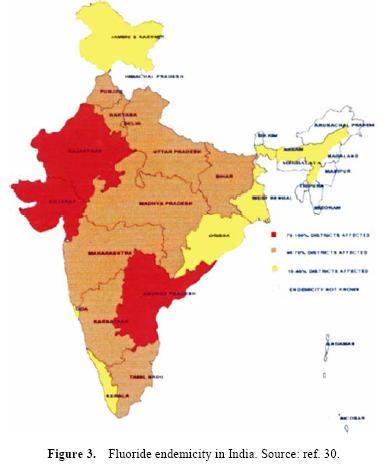/regions/india
India
Challenges of sustainable water quality management in rural India - Current Science
Posted on 23 Aug, 2011 04:51 PM The article informs that access to safe drinking water remains an urgent necessity, as 30% of urban and 90% of rural households still depend completely on untreated surface or groundwater.
The article informs that access to safe drinking water remains an urgent necessity, as 30% of urban and 90% of rural households still depend completely on untreated surface or groundwater.
While access to drinking water in India has increased over the past decade, the tremendous adverse impact of unsafe water on health continues. It is estimated that about 21% of communicable diseases in India are water related.
Although some degree of intervention in terms of chlorination and monitoring of water quality exists in major cities and towns, rural India, which constitutes the bulk (70%) of the population, is usually deprived of such interventions. The population in rural India is mainly dependent on the groundwater as a source of drinking water. As a quality concern the groundwater is often found to be contaminated with fluoride, arsenic, iron and salts. In recent years, fluorosis has emerged as major public health issue in rural India.
Sanitation - The hygienic means of promoting health - Indian Journal of Public Health
Posted on 23 Aug, 2011 11:10 AMThis article published in the Indian Journal of Public Health highlights the importance of sanitation as hygienic means of dealing with health of populations and presents the history and the definition of sanitation and highlights t
Biomass for sustainable development - Lessons for decentralized energy delivery in India – A report by World Bank
Posted on 22 Aug, 2011 07:55 PM It presents a summary of recommendations for enhancing the effectiveness of energy service delivery through a decentralized program, which currently finds a critical place in the Government‘s energy policies and electrification targets.
It presents a summary of recommendations for enhancing the effectiveness of energy service delivery through a decentralized program, which currently finds a critical place in the Government‘s energy policies and electrification targets.
The pilot phase of the Village Energy Security Programme has shown several lessons and the need for improvements.
The relevance of traditional knowledge for health, well being and sustainable development - Indian Journal of Traditional Knowledge
Posted on 22 Aug, 2011 12:27 PMThis paper published in the journal Indian Journal of Traditional Knowledge is an attempt to discuss the traditional knowledge of elderly people, their role and highlights many areas w
Malaria control manual - Guidance for malaria control projects in humanitarian situations - Published by OXFAM
Posted on 20 Aug, 2011 10:32 PMThis manual on the Eldis site published by OXFAM provides guidance to public health promoters, water and sanitation engineers, project co-ordinators
Draft of Land Acquisition and Resettlement & Rehabilitation Bill, 2011 in public domain - Comments invited by Ministry of Rural Development till 31st August, 2011
Posted on 15 Aug, 2011 05:35 PMGuest post by: Amita Bhaduri
The drafting of a new legislation on these issues was taken up by a Group of Ministers in May 2007 and this is the second draft bill presented by the UPA Government.
Virological evaluation of domestic water purification devices in India - Inadequate quality and the need for virological standards - Tropical Medicine and International Health
Posted on 14 Aug, 2011 03:36 PMThis paper published in the journal
Integrated Low Cost Sanitation Scheme - Revised guidelines by the Ministry of Housing and Urban Poverty Alleviation (2008)
Posted on 12 Aug, 2011 04:29 PMThe objective of the scheme is to convert or construct low cost sanitation units through sanitary two pit pour flush latrines with superstructures and appropriate variations to suit local conditions (area specific latrines) and construct new latrines where economically weaker sections household have no latrines and follow the in-human practice of defecating in the open in urban areas. This would improve overall sanitation in the towns.
Draft guidelines for taking up works relating to access to sanitation facilities by Ministry of Rural Development - Request for comments by August 15, 2011
Posted on 09 Aug, 2011 11:15 PMThe Ministry of Rural Development, Government of India has developed draft guidelines expanding the scope of works under schedule 1 Para 1 (ix) of Mahatma Gandhi National Rural Employment Guarantee Scheme to include access to sanitation facilities. This has been prompted by demands from several States/quarters for ensuring sanitation facilities in rural areas with the main goal of ensuring a clean environment, thereby bringing about an improvement in the general quality of life and strengthening the livelihood base.
Rainfed agriculture - Meeting the challenges of food security in India – A paper in Current Science
Posted on 08 Aug, 2011 06:40 PMThe paper notes that there are large opportunities for gains from adaptation and new investments in water management for meeting the targets under the proposed National Food Security Act.